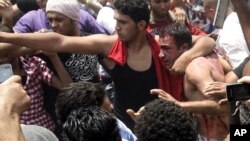Turmoil is growing in Egypt in the run-up to the first round of presidential elections, scheduled for May 23 and 24. The violence claimed at least 11 lives when unknown assailants attacked a protest against Egypt's ruling generals.
Crowds of young men threw stones at each other and at Egyptian security forces near the defense ministry in Cairo Wednesday, as tensions rose in the leadup to presidential elections later this month.
Witnesses say armed thugs, known as "baltagiya," attacked protesters who had been camped out in Abbassiya Square since Friday. The attackers were wielding guns, knives and crowbars, beginning around dawn.
One man said the assailants behaved like some pro-government supporters did last year in clashes during the revolution which overthrew longtime president Hosni Mubarak.
He asks, "Why are they behaving like this with us, like they did at Tahrir Square? If they want to defend the area, let the Military Council build a wall around it like they did next to the prime minister's office," he said.
The mostly Islamist protesters had been camping near the Egyptian defense ministry in Cairo's Abbassiya district since Saturday, demanding an immediate end to military rule in Egypt. The protesters fought back against the assailants, described by some witnesses as pro-government "thugs." The rival groups attacked each other with firebombs and stones. Gunfire also was heard at the scene.
Most of those taking part in the sit-in near the defense ministry are Islamist supporters of Salafi candidate Hazem Saleh Abou Ismail. Abou Ismail called for the sit-in to protest his exclusion from the presidential race, following revelations that his late mother held a U.S. passport. Egypt's constitution stipulates that presidents be born of two Egyptian parents.
Egyptian state TV reported that two of 13 candidates in the presidential race, Abdel Moneim Abol Fotouh and Muslim Brotherhood candidate Mohamed Mursi, have suspended their campaigns to honor the victims of Wednesday's violence.
Said Sadek, who teaches political sociology at the American University in Cairo, says the focal point of protests in the leadup to the presidential election has shifted from Tahrir Square, center of last year's revolution, to the square facing the defense ministry.
"Tahrir lost its power to influence the decision-making process in Egypt, and that's why the protesters began to move to the real center of power - the ministry of defense - and that is a bit dangerous, because it would mean you could have a coup," Sadek stated. "If you encircle the ministry of defense where the SCAF is located, in this way."
Sadek says the situation in Egypt is "extremely volatile" and points to what he says is growing popular resentment against both the ruling military council and the powerful Muslim Brotherhood.
The SCAF has been accused of stifling dissent by killing protesters, detaining critics and undermining the youth and civil society groups which led last year's uprising.
Egypt's generals have promised to hand power to a civilian administration by the end of June, after the presidential election that they say will be free and fair.
| Join the conversation on our social journalism site - Middle East Voices. Follow our Middle East reports on Twitter and discuss them on our Facebook page. |




